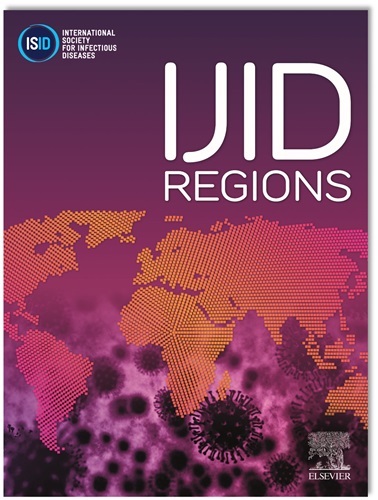美国难民中结核病感染流行率和治疗完成情况。
IF 4.8
2区 医学
Q1 INFECTIOUS DISEASES
引用次数: 0
摘要
背景:在患结核病风险较高的难民中识别和治疗结核病感染(TBI)对于美国预防和消除结核病至关重要。然而,目前的证据因样本量小、仅纳入来自单一国家的难民和/或仅依赖结核菌素皮试(TST)而受到限制:方法:在一项大型队列研究中,来自美国十个地点的难民使用三种可用的检测方法(TST 和两种干扰素-γ 释放测定法(IGRA))接受了 TBI 评估。这项研究计算了TBI的流行率,并评估了难民中结核病预防治疗(TPT)的完成情况,将TBI流行率定义为至少两项检测结果呈阳性:在2012年7月至2017年5月登记的8960名难民中,结核病感染率为23.2%(95%置信区间[CI]:22.4%-24.1%)。TPT完成率为81.2%(95% 置信区间:79.6%-82.7%)。与6个月或更长时间的治疗方案相比,3个月的较短治疗方案与较高的治疗完成率相关:结论:难民的创伤性脑损伤发病率很高,这是一个令人担忧的问题,但他们对 TPT 的接受率和完成率都很高,这提供了一个机会。基于 IGRA 的测试是这一人群的首选;然而,有限的资源凸显出需要更精确的筛查方法,以更好地识别真正需要 TPT 的高危人群。本文章由计算机程序翻译,如有差异,请以英文原文为准。
Tuberculosis infection prevalence and treatment completion among refugees in the United States
Background
Identifying and treating tuberculosis infection (TBI) among refugees at elevated risk for developing TB disease is crucial for TB prevention and elimination in the United States (U.S.). However, current evidence is limited by small sample sizes, inclusion of refugees from only a single country, and/or reliance solely on the tuberculin skin test (TST).
Methods
Refugees in a large cohort study from 10 U.S. sites underwent evaluation for TBI using three available tests: the TST and two interferon-gamma release assays (IGRAs). This study calculated TBI prevalence and assessed tuberculosis preventive treatment (TPT) completion among refugees, defining TBI prevalence as positive results on at least two tests.
Results
Among 8960 refugees enrolled July 2012 through May 2017, TBI prevalence was 23.2% (95% confidence interval [CI]: 22.4%-24.1%). Completion of TPT was 81.2% (95% CI: 79.6%-82.7%). Shorter treatment regimens of 3 months were associated with higher treatment completion compared to regimens of 6 months or longer.
Conclusion
The high TBI prevalence among refugees is a concern, but their high TPT acceptance and completion rates offer an opportunity. IGRA-based tests are preferred in this population; however, limited resources underscore the need for more precise screening approaches to better identify high-risk individuals who truly require TPT.
求助全文
通过发布文献求助,成功后即可免费获取论文全文。
去求助
来源期刊
CiteScore
18.90
自引率
2.40%
发文量
1020
审稿时长
30 days
期刊介绍:
International Journal of Infectious Diseases (IJID)
Publisher: International Society for Infectious Diseases
Publication Frequency: Monthly
Type: Peer-reviewed, Open Access
Scope:
Publishes original clinical and laboratory-based research.
Reports clinical trials, reviews, and some case reports.
Focuses on epidemiology, clinical diagnosis, treatment, and control of infectious diseases.
Emphasizes diseases common in under-resourced countries.

 求助内容:
求助内容: 应助结果提醒方式:
应助结果提醒方式:


